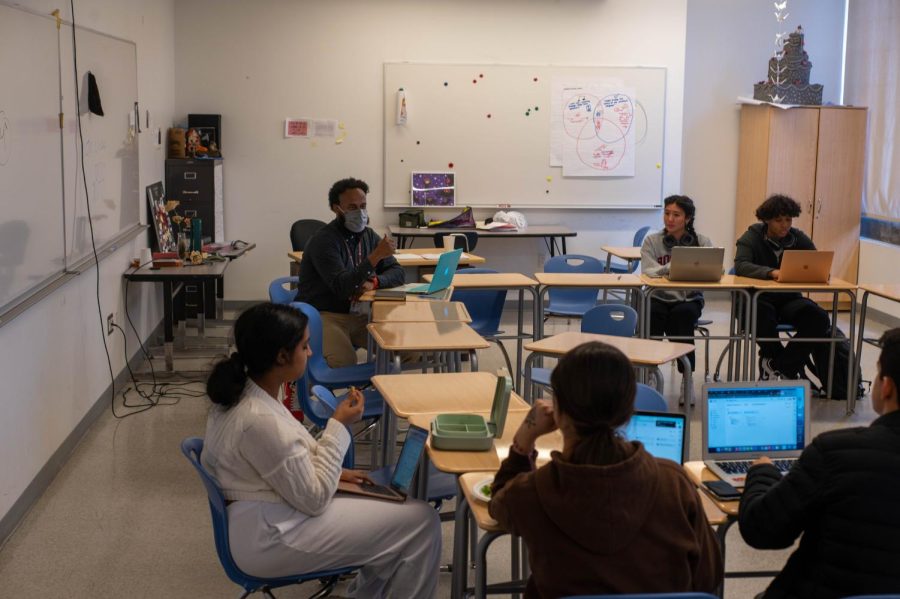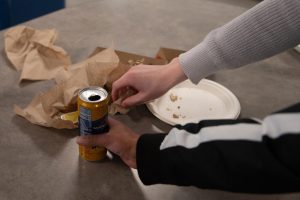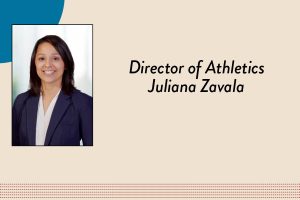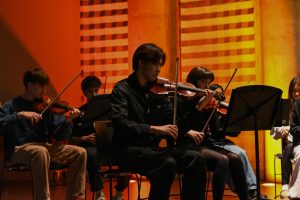Teddy Stripling creates forum to facilitate discussions, understanding
Through two English classes, Teddy Stripling has found a way to create a discussion forum for students regarding complex topics in literature and connect with students who don’t usually connect.
April 14, 2023
In a survey of over 20,000 U.S. high school students, researchers from the Yale Center for Emotional Intelligence and the Yale Child Study Center found that nearly 75% of students’ feelings related to school were negative. It’s no different at Lab, where the recent results from the 2022 wellness survey showed that 30% of Lab students felt a low desire to be at school, over 5% more than the national average.
Theodore “Teddy” Stripling, a counselor at U-High, has been working to lower that percentage. He believes in providing students with a time to connect and feel more secure in the usually rigorous environment.
Mr. Stripling has begun working with English teachers Katharine McJimsey and Maja Teref. He joins their classes weekly to facilitate discussions surrounding difficult themes in literature, as well as breaking the ice between pre-formed cliques in a beneficial way.
“It’s a moment for our classes to just be human beings. It’s much easier to do in English classes because we can relate everything to life in the end. Yet, it would be nice to allow students to talk if they feel uncomfortable in other classes,” Ms. Teref said. “What if students are anxious about a test that’s coming up? It would be nice to just air out your opinions and get it all out, to find solutions and form common ground, as opposed to suffering in silence.”
Mr. Stripling is a firm believer in comfort and self-reflection. As a child of divorced parents, he said he often found himself seeking out safe spaces, so he could escape from the stress of his parents’ arguments.
“I like to meditate. Whenever stuff got a little too chaotic and I needed to calm down, I would go outside, to the backyard,” Mr. Stripling said. “That was my way of chilling out for a little bit. It’s a skill that I believe in. Everyone should find a way to get their space, if and when they can.”
Throughout his experience at previous schools, he recognized that students have to deal with the weight of dealing with serious topics on their own, due to feeling unaccustomed to their peers and being scared of the social punishments of oversharing.
“There are difficult conversations that come up in classrooms all the time. If you don’t feel comfortable with the people in your class, you’re not going to talk. The idea is that if we can give students a space to get to know each other, then they’ll be more likely to take a risk and feel more comfortable when they want to talk about difficult topics in the classroom,” he said.
During his visits, Mr. Stripling brings a stuffed animal with him to use as a talking stick, which students can pass around and take turns sharing how they feel without being disrupted or excluded.
“Mr. Stripling really strives to make it a safe space. Some of the topics we discuss can be centered around race, sex and discrimination, and, you know, those are pretty hard to talk about,” ninth grader Amira Moultrie said.
Amira’s class read “The House on Mango Street,” which is centered around the fall from innocence, race and gender roles. These themes can be difficult for some, prompting students to reflect on their own identities. Mr. Stripling’s meetings allow students to delve deeper into that and find shared concerns and feelings.
“It gives people a chance to actually sit down and talk about how they’re feeling instead of just rushing through everything, when we don’t have time to actually focus on how we’re feeling in that moment,” Amira said.
Across the country, many schools have been implementing similar restorative justice programs, to help prevent isolation and discomfort. After implementation, 97.7 percent of students reported feeling much safer in school than before, according to the Justice and Prevention Research Center.
Ms. Teref feels grateful for the help of this program, explaining that her class feels more open and comfortable now.
“The group was a little distant at first, which I totally understand, but now there’s more focus, mutual respect and comfort in each other. It feels like they’ve been becoming friends in addition to simply following the curriculum,” Ms. Teref said.
Mr. Stripling hopes to continue with the Reformative Justice circles, and implement them in other classes and programs. He also plans to hear from the students themselves, in order to tune in to their ideas and help them feel more welcome and comfortable at Lab.
“Many think most ideas just come from adults in our schools,” he continued, “That’s simply not true. They come from students, most of the time, and people need to recognize that.”




























































